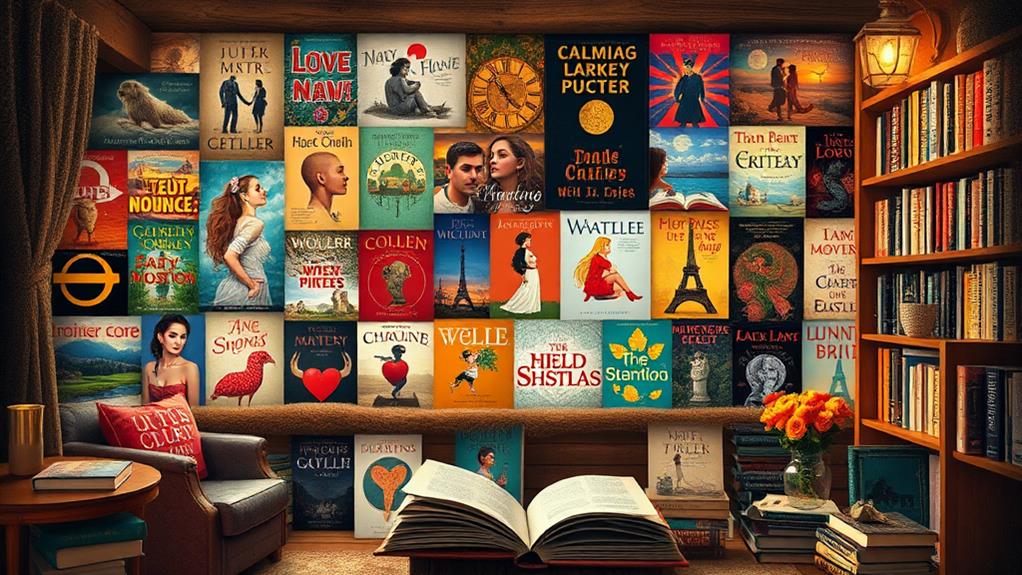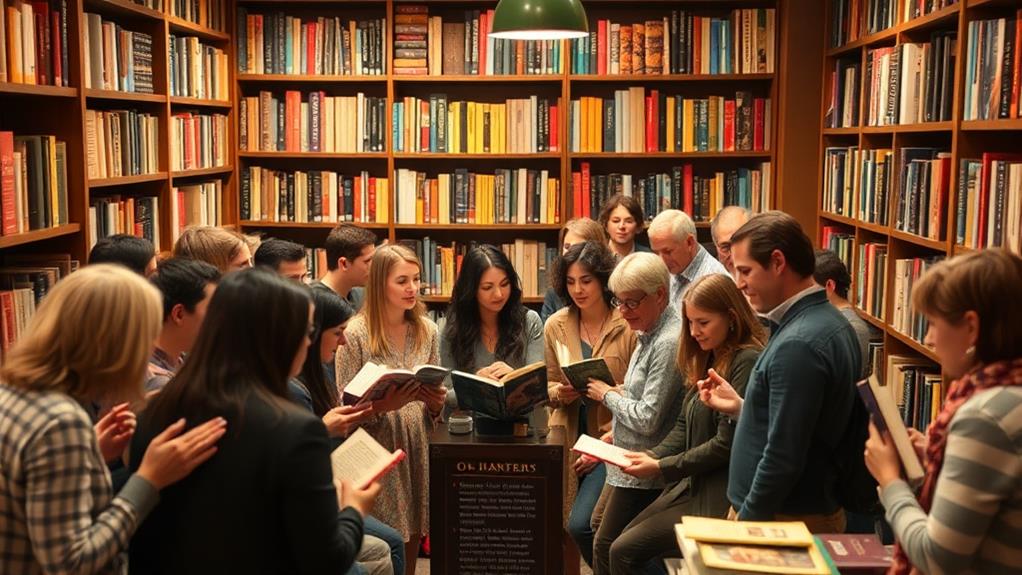BBC's Big Read highlights the top novels that captured the hearts of readers across the UK. Launched in 2003, it invited public nominations, showcasing a rich variety of literary tastes. Classics like "Pride and Prejudice," "To Kill a Mockingbird," and "The Lord of the Rings" feature prominently, each tackling themes like social class, racial injustice, and epic adventures. The initiative sparked conversation about the importance of these stories in society, engaging readers and bringing communities together. There's so much more behind these beloved titles, and if you explore further, you might uncover even greater insights into their impact.
Overview of the Big Read
The Big Read was a groundbreaking initiative launched by the BBC in April 2003 that sought to uncover the UK's favorite novel through direct public participation. This innovative project invited you and countless others to nominate your best-loved novels, creating an immense tapestry of literary tastes across the nation.
Significantly, many classics like David Copperfield by Charles Dickens emerged as favorites, showcasing the enduring appeal of timeless storytelling. The process culminated in a countdown of the top 100 novels, aired on BBC2, capturing the attention and hearts of many.
As you participated, the BBC provided a platform where you could vote for your favorite books, and a scoring system determined the rankings. The level of public engagement was remarkable, allowing for a diverse array of voices to be heard.
Beyond the top 100, the initiative featured a list of the top 200 books, showcasing even more reading choices and interests.
The Big Read didn't just highlight popular titles; it sparked conversations about the importance of reading in society and how literature resonates with different people.
Ultimately, this initiative brought communities together, fostering a shared appreciation for storytelling and the written word, all while allowing you to play an active role in celebrating literature.
Impactful Novels on the List
Many of the novels featured in the Big Read not only captivated readers but also left a lasting impact on society and culture. For instance, "Pride and Prejudice" by Jane Austen is more than just a love story; it challenges social class norms, earning an impressive average rating of 4.29 from over 4.4 million readers.
Similarly, "To Kill a Mockingbird" by Harper Lee addresses racial injustice and moral growth, striking a chord with more than 6.3 million readers and achieving a rating of 4.26. This theme of systemic racism resonates through many impactful works, including Richard Wright's "Native Son," which explores the devastating effects of racial discrimination.
J.R.R. Tolkien's "The Lord of the Rings" showcases epic storytelling, earning a remarkable average score of 4.53, solidifying its place in the fantasy genre.
George Orwell's "Nineteen Eighty-Four" explores themes of totalitarianism, maintaining relevance in today's discussions about privacy and freedom with a rating of 4.19 from over 4.8 million ratings.
Finally, "Jane Eyre" by Charlotte Brontë emphasizes themes of independence and morality, garnering 4.15 from over 2.1 million ratings.
Each of these impactful novels not only tells a compelling story but also resonates deeply with readers, shaping societal views and discussions.
Themes in Popular Literature

Exploring themes in popular literature reveals the diverse issues that resonate with readers across generations. From love and identity to adventure and moral dilemmas, these themes reflect the human experience in profound ways.
- Social Class and Love: In "Pride and Prejudice," Jane Austen intricately weaves themes of love and social class, showcasing how societal expectations shape relationships.
- Totalitarianism: George Orwell's "Nineteen Eighty-Four" serves as a chilling exploration of surveillance and control, prompting readers to reflect on the importance of freedom and individuality.
- Identity and Belonging: Harper Lee's "To Kill a Mockingbird" investigates racial injustice and moral growth, highlighting the complexities of identity and belonging in a divided society.
Other notable works like "Wuthering Heights" explore revenge and redemption through tumultuous love stories.
Meanwhile, "The Lion, the Witch and the Wardrobe" captures friendship and adventure in a fantastical setting.
Each of these books not only entertains but also challenges you to think critically about the themes that shape our world, making them timeless classics that captivate readers.
Notable Authors and Their Works
Numerous authors have left an indelible mark on literature, enchanting readers with their unique storytelling and profound themes. When the BBC's Big Read began, it highlighted the works of some of these notable writers, inviting you to nominate your favourite.
J.K. Rowling's Harry Potter series remains a beloved staple in children's literature, boasting impressive ratings that reflect its universal appeal. Similarly, J.R.R. Tolkien's Lord of the Rings showcases epic storytelling, influencing the fantasy genre and enthralling millions.
The rich character development and moral transformations in literature, such as those seen in Dickens' social class critique, resonate deeply with readers, adding layers of complexity to their narratives.
Jane Austen's Pride and Prejudice, with its exploration of love and social class, has maintained enduring popularity through countless adaptations, resonating with readers across generations.
George Orwell's Nineteen Eighty-Four stands as a pivotal dystopian novel, examining themes of totalitarianism and surveillance, making it a relevant read even today.
Finally, Harper Lee's To Kill a Mockingbird addresses critical issues of racial injustice and moral growth, solidifying its place as an essential work in American literature.
These authors and their masterpieces not only reflect their times but also continue to engage and inspire readers worldwide.
Reader Engagement and Community

The impact of literature transcends individual authors and their works, fostering a vibrant community of readers who share their passions and insights. The Big Read brilliantly engaged UK readers by inviting public nominations, resulting in a diverse list of 200 titles. This initiative encouraged reader engagement through various voting methods like Web, SMS, and telephone, allowing you to feel a sense of ownership over the literary choices.
The initiative also highlighted the importance of personal growth and resilience found within the pages of many nominated titles, inspiring readers to overcome challenges and release their potential through stories of triumph and perseverance exploring personal power.
- The program sparked increased interest in reading across the nation.
- It facilitated discussions about reading preferences and experiences.
- Readers connected through shared literary appreciation of different genres and themes.
The countdown of the top 100 books aired on BBC2, drawing significant media attention and encouraging community discourse on literature. By including a wide range of genres and themes, the Big Read allowed readers from various backgrounds to connect with different narratives.
This not only enriched discussions about reading but also strengthened community bonds. The success of the initiative exemplified how literature can unite people, fostering a deeper connection and appreciation for the written word.
Conclusion
In the grand tapestry of storytelling, these remarkable novels have woven themselves into the heart of the nation. They've sparked conversations, ignited imaginations, and brought communities closer together, each page a gentle invitation to explore new worlds. As you close the cover on these beloved books, remember that their whispers linger on, urging you to dive back in or discover new tales waiting to be told. Let the journey of reading continue, enriching your life one story at a time.



